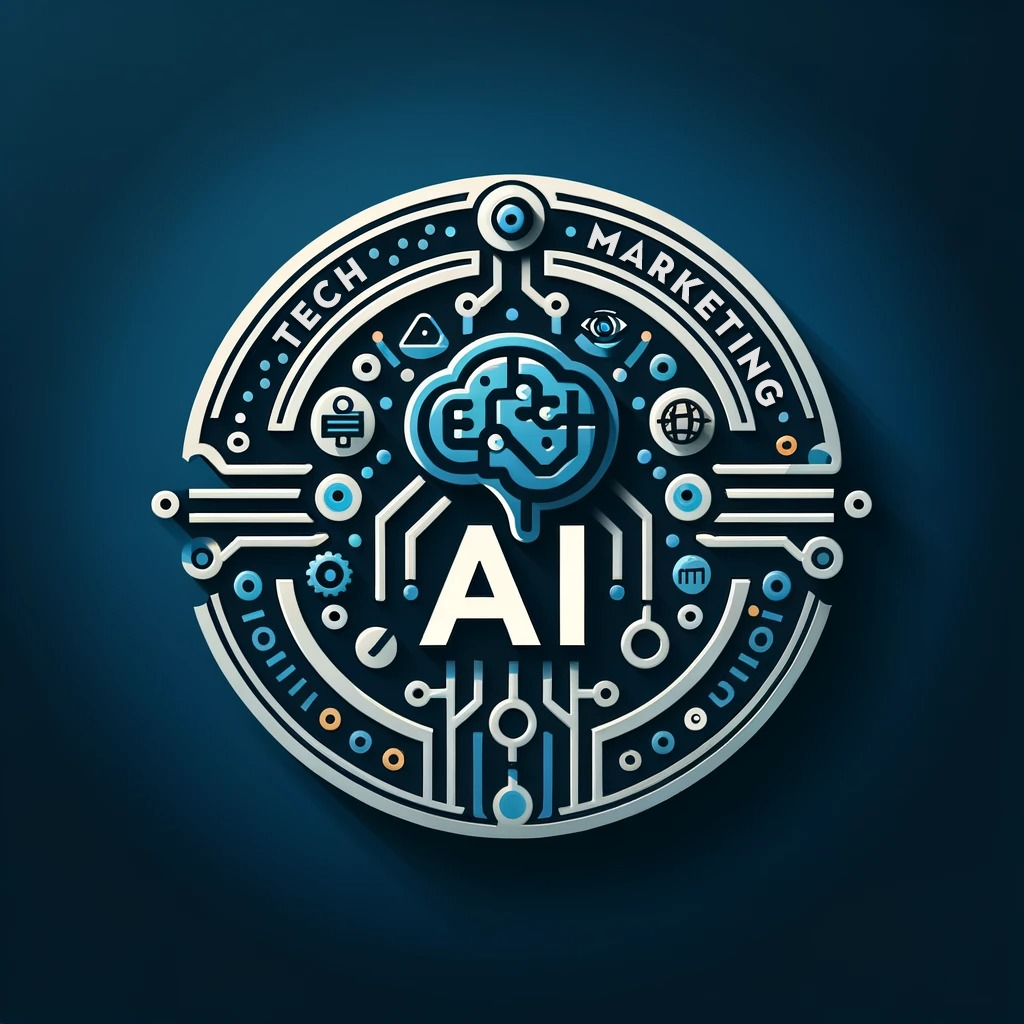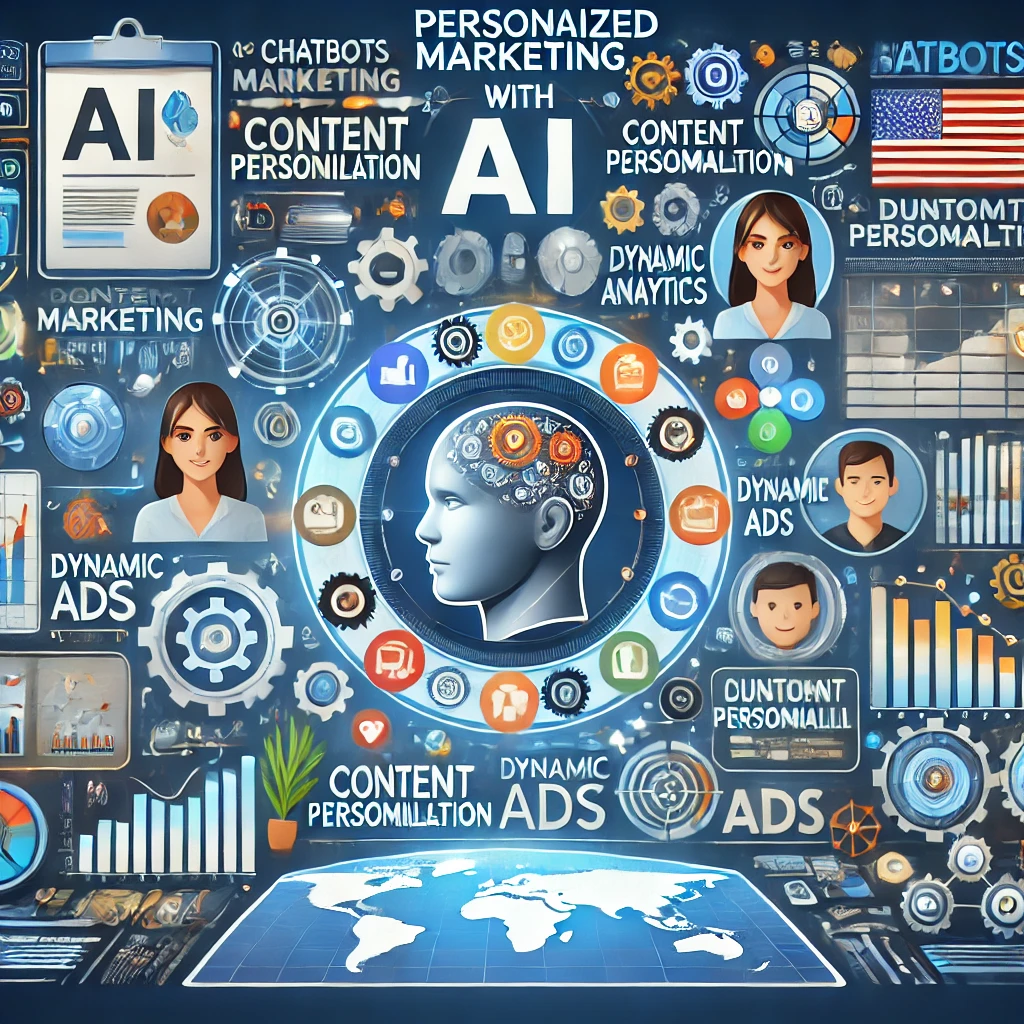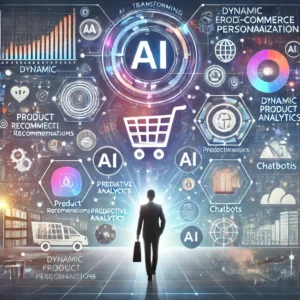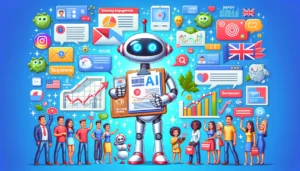In today’s competitive market, businesses must go beyond traditional marketing methods to captivate customers’ attention. Personalized marketing, powered by Artificial Intelligence (AI), is at the forefront of this shift, enabling brands to create unique, tailored experiences for each consumer. For companies across the USA, UK, Canada, Australia, and Europe, AI-driven personalization is more than a trend; it’s a strategic necessity that drives engagement, conversion, and loyalty.
Why Personalized Marketing Matters
Consumers today expect personalization in their interactions with brands. Research from Accenture reveals that 91% of consumers are more likely to shop with brands that provide relevant offers and recommendations. Personalization boosts customer satisfaction, fosters loyalty, and increases conversion rates. AI amplifies these benefits by analyzing vast datasets to understand consumer behavior, preferences, and needs.
How AI Drives Personalized Marketing
AI enhances personalized marketing by automating the process of analyzing customer data and delivering tailored experiences at scale. Here are some key ways AI drives personalized marketing:
- Customer Segmentation and Insights
AI enables businesses to segment customers based on various attributes such as demographics, browsing behavior, purchase history, and more. Traditional segmentation is often limited to broad categories, but AI-driven segmentation dives deeper, allowing for micro-segmentation.
For example, Amazon, a global e-commerce leader, uses AI to analyze customer data and create segments based on granular details like browsing patterns and purchasing frequency. This data-driven approach allows Amazon to offer personalized product recommendations, increasing conversion rates and enhancing the customer experience.
- Dynamic Content Generation
AI-powered tools like Persado and Phrasee are revolutionizing content creation by generating personalized messages tailored to individual customer preferences. These tools use natural language processing (NLP) to craft unique emails, social media posts, and advertisements that resonate with target audiences.
A notable example is Adidas, which utilized AI-driven content personalization to boost engagement rates in its email campaigns. By leveraging AI to analyze customer data and generate personalized messages, Adidas achieved a 40% increase in click-through rates compared to traditional methods.
- Predictive Analytics for Personalized Recommendations
AI leverages predictive analytics to forecast customer behavior, enabling brands to deliver personalized recommendations proactively. Streaming giant Netflix, for instance, uses AI algorithms to analyze viewer preferences and provide customized show and movie suggestions. This approach has been key to Netflix’s success, with 80% of its views attributed to personalized recommendations.
Similarly, Spotify employs AI to create personalized playlists like “Discover Weekly,” which are tailored to individual listening habits. This strategy has significantly increased user engagement and retention, making Spotify a market leader in music streaming across the USA, UK, and Europe.
- Personalized Ad Targeting
AI has transformed digital advertising by allowing brands to target specific audiences with precision. Platforms like Facebook, Google Ads, and LinkedIn employ AI algorithms to deliver ads based on user behavior, interests, and demographics.
For instance, the UK-based online fashion retailer ASOS uses AI to personalize ads on platforms like Facebook and Instagram. By analyzing data on customer behavior and preferences, ASOS can display relevant ads to potential buyers, resulting in a higher return on ad spend (ROAS) and improved customer acquisition rates.
- Chatbots and Virtual Assistants
AI-driven chatbots and virtual assistants provide personalized customer support and engagement 24/7. These tools can answer queries, provide product recommendations, and assist in the purchase process, all based on individual customer data.
H&M, a global fashion retailer with a strong presence in Europe and North America, has integrated AI-powered chatbots into its customer service strategy. The chatbot engages with customers on platforms like Facebook Messenger, offering personalized styling advice and product suggestions based on user preferences.
Key Strategies for Implementing AI in Personalized Marketing
To successfully implement AI in personalized marketing, businesses need to adopt effective strategies that align with their goals and customer expectations. Here are some proven strategies:
- Leverage Customer Data Effectively
The foundation of personalized marketing is data. Businesses need to collect and analyze customer data from various touchpoints, including websites, social media, and mobile apps. Tools like Google Analytics, HubSpot, and Salesforce offer robust data collection and analysis capabilities.
For example, UK-based retailer Marks & Spencer (M&S) uses Salesforce Marketing Cloud to collect and analyze customer data from multiple channels. This data-driven approach enables M&S to deliver personalized content and offers, driving engagement and sales.
- Utilize AI-Powered Tools for Content Personalization
AI tools like Dynamic Yield, Optimizely, and Adobe Target help businesses deliver personalized content experiences. These platforms use machine learning algorithms to test different content variations and identify what resonates best with specific customer segments.
Australian airline Qantas uses Adobe Target to personalize its website content based on customer data, such as browsing history and flight preferences. This strategy has improved user engagement and increased conversion rates by offering relevant content tailored to individual travelers.
- Implement Predictive Analytics for Forecasting Customer Behavior
Predictive analytics tools like IBM Watson, SAS Customer Intelligence, and RapidMiner enable businesses to anticipate customer needs and behaviors. By analyzing historical data, these tools help marketers identify trends and patterns, allowing them to tailor their marketing strategies accordingly.
For instance, Canadian telecom company Rogers Communications uses predictive analytics to anticipate customer churn. By identifying at-risk customers early, Rogers can take proactive steps, such as offering personalized incentives, to retain them.
- Optimize Ad Campaigns with AI Algorithms
AI-powered advertising platforms like Google Ads, Facebook Ads, and programmatic ad platforms use machine learning to optimize ad campaigns in real-time. These platforms analyze data to identify the best-performing ads and allocate budgets effectively.
A good example is IKEA, which uses AI-driven programmatic advertising to deliver personalized ads to different customer segments in the USA and Europe. This approach has helped IKEA increase brand awareness and drive more traffic to its online and offline stores.
- Integrate AI Chatbots for Personalized Customer Interactions
AI chatbots like Drift, Intercom, and Chatfuel can enhance customer engagement by providing personalized interactions and support. These tools use natural language processing (NLP) to understand customer queries and offer relevant responses.
For example, HSBC, a leading global bank with a strong presence in Europe, uses AI-powered chatbots to provide personalized financial advice and customer support. This has improved customer satisfaction and reduced response times.
Challenges in AI-Driven Personalized Marketing
While AI offers numerous benefits, businesses must also be aware of the challenges:
- Data Privacy Concerns
With increasing regulations such as the General Data Protection Regulation (GDPR) in Europe and the California Consumer Privacy Act (CCPA) in the USA, businesses must ensure compliance with data privacy laws. Transparency in data collection and usage is essential to build trust with customers.
- Integration with Existing Systems
Integrating AI tools with existing marketing platforms and systems can be complex and requires technical expertise. Businesses must ensure seamless integration to maximize the benefits of AI-driven personalization.
- Cost and Resource Allocation
Implementing AI solutions can be expensive, especially for small and medium-sized businesses. Companies must carefully evaluate their budget and resources before investing in AI technologies.
Future Trends in AI-Powered Personalized Marketing
The future of personalized marketing is bright, with AI continuing to play a pivotal role. Here are some emerging trends:
- Hyper-Personalization
Hyper-personalization takes AI-driven marketing to the next level by using real-time data to deliver highly individualized content and experiences. This approach will become more prevalent as businesses strive to stand out in a crowded marketplace.
- Voice and Visual Search Optimization
As voice-activated devices and visual search technologies gain popularity, businesses will need to optimize their content for these new search methods. AI will be crucial in understanding voice and image-based queries and delivering relevant results.
- AI in Influencer Marketing
AI tools like Influencity and HypeAuditor are helping brands identify the right influencers and measure the impact of influencer campaigns. This trend will continue to grow as brands seek more authentic and targeted marketing strategies.




